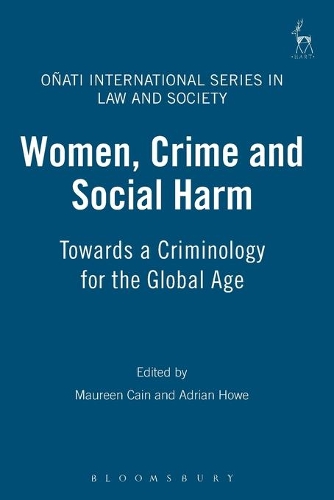
Women, Crime and Social Harm: Towards a Criminology for the Global Age
(Paperback)
Available Formats
Publishing Details
Women, Crime and Social Harm: Towards a Criminology for the Global Age
By (Author) Maureen Cain
Edited by Adrian Howe
Bloomsbury Publishing PLC
Hart Publishing
3rd November 2008
United Kingdom
Classifications
Professional and Scholarly
Non Fiction
345
Physical Properties
Paperback
234
Width 156mm, Height 234mm, Spine 11mm
Description
This book of eleven chapters and an Introduction is by and about women, the harms and crimes to which they are subjected as a result of global social processes and their efforts to take control of their own futures. The chapters explore the criminogenic and damaging consequences of the policies of the global financial institutions as well as the effects of growing economic polarisation both in pockets of the developed world and most markedly in the global south. Reflecting on this evidence, in the Introduction the editors necessarily challenge existing criminological theory by expanding and elaborating a conception of social harm that encompasses this range of problems, and exposes where new solutions derived from criminological theory are necessary. A second theme addresses human rights from the standpoint of indigenous women, minority women and those seeking refuge. Inadequate and individualised as the human rights instruments presently are, for most of these women a politics of human rights emerges as central to the achieving of legal and political equality and protection from individual violence. Women in the poorest countries, however, are sceptical as to the efficacy of rights claims in the face of the depredations of international and global capital, and the social dislocation produced thereby. Nonetheless this is a hopeful book, emphasising the contribution which academic work can make, provided the methodology is appropriately gendered and sufficiently sensitive in its guiding ideology and techniques to hear and learn from the all too often 'glocalised' other. But in the end there is no solution without politics, and in both the opening and the closing sections of this book there are chapters which address this. What continues to be special about women's political practice is the connection between the groundedness of small groups and the fluidity and flexibility of regional and international networks: the effective politics of the global age. This book, then, is a new criminology for and by women, a book which opens up a new criminological terrain for both women and men - and a book which cannot easily be read without an emotional response.
Reviews
...admirably adds to our understanding in global criminology, specifically with a focus on the position of women...What is probably most remarkable about this collection, apart from its various chapters' substantive merits, is that it reads truly as the work of a collective. Mathieu Deflem The Law & Politics Book Review Vol.19, No.8, August 10, 2009 This thought-provoking collection ... provides a critical exploration of various expressions of women's victimization in the context of globalization, setting the stage for an emergent feminist global criminology. The contributions are presents in a manner that is accessible for audiences from a variety of disciplines and perspectives. This collection is the first to provide a review of harms and expressions of violence against women in the context of globalization. It's value lies in the broad interpretation of violence against women, which incorporates not only physical by also social, economic, political and spiritual harm. Edna Erez Law and Society Review Volume 44, Issue 2 This vibrant collection as a whole shows how the tension between the local and the global can be navigated through appreciating, as Walklate highlights, the lessons of standpoint feminism to knowledge construction, and an acknowledgment of the diversity of women's lives (Cain and Howe 2008: 212-13). It makes a strong case for pushing the boundaries of criminology to encompass an analytic of social harm to reveal those cases of 'censure without sanction' (Cain and Howe 2008: 17). Louise Boon-Kuo Current Issues in Criminal Justice Volume 22, Number 2
Author Bio
Maureen Cain is a sociologist. She has worked at Brunel University, the University of the West Indies, St Augustine, and the University of Birmingham. Adrian Howe is an Associate Professor in Social Science at RMIT University.
